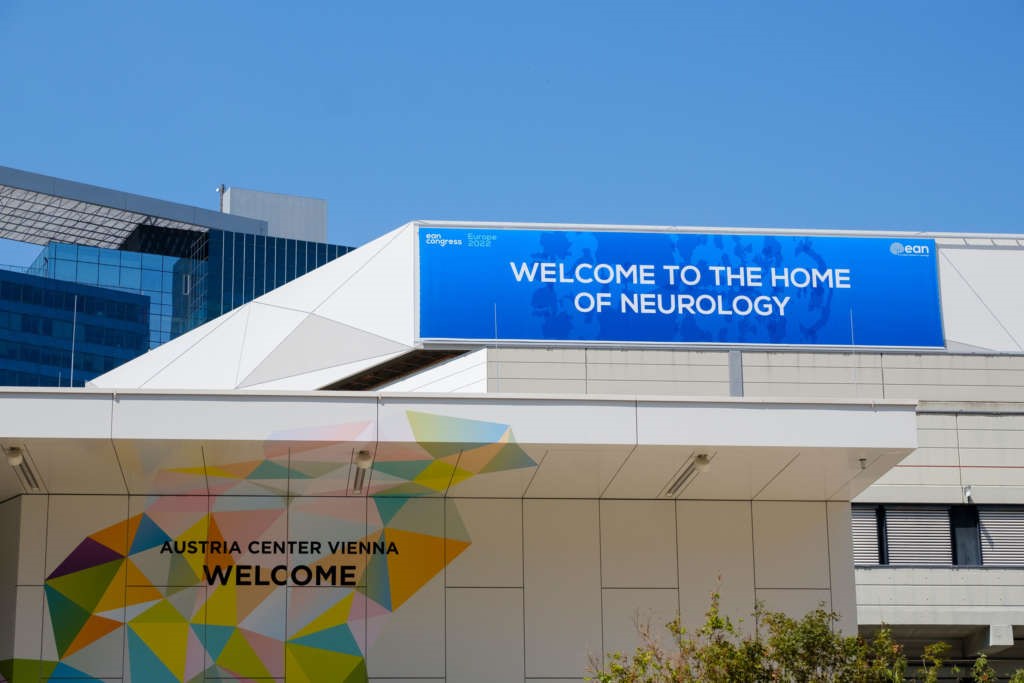
This year, Early Stage Researchers (ESRs) of the Bio2Brain consortium attended the 8th congress of the European Academy of Neurology (EAN). With over 2.200 submitted abstracts and 380 lectures given onsite and online, this conference the EAN is a major scientific event, gathering neuroscientists and neurologists from all over the world.
This congress was also an important social event for the Bio2Brain consortium, given that it was the first occasion for all ESRs to meet in person. Previous meetings were held online due to travel restrictions during the Covid-19 pandemic in Europe.
This year, the EAN congress took place from 25 to 28 June at the Austrian International Center of Vienna, in Austria. 5,300 onsite and 2,700 online participants attended the EAN congress. The venue was divided into two areas. In the exhibition hall, 38 pharma companies, including leading companies such as Roche or Novartis, shared information about their products. Likewise, a poster area, where discoveries of basic and clinical research were presented, was set in this hall. The other area comprised all lecture halls. Among 380 lectures, renowned speakers presented the newest and most promising results from clinical and basic studies on MS and other neurological diseases. The diversity of sessions allowed ESRs to interact with experts, in the frame of workshops, interactive session, hands-on courses, teaching courses, and ePoster sessions. In particular, the teaching courses were a great success, because they provided basic information on the mechanisms of action of disease-modifying treatments (DMTs) and on the pathological mechanisms of neuroimmune diseases like MS.
For the ESRs, it has been the first in person conference since the beginning of the project. Our conference visit began with an interesting session about therapy relevant pathomechanisms in MS with presentations given for instance by Prof. Hans Lassmann, a very famous neurologist from Vienna. This talk was an introduction on MS pathogenesis and current state-of-the-art research. Afterwards, we had time for a first stroll through the exhibition hall and reached out to representatives of the different pharma companies. With a nice lunch in the exhibition hall, we finished the first part of the day. In the afternoon, we attended a symposium about MS and related disorders. The presenters shed light on the best treatment strategies for MS and tried to extrapolate knowledge from MS to rarer neuroimmune diseases like neuromyelitis optica spectrum disorders (NMOSD). These presentations were a good start for us to understand the current state of knowledge and attempts of treating neuroimmune diseases. This symposium was the last of the first day. Subsequently, we went for sightseeing in the beautiful city of Vienna and had dinner together for the first time.
The next day started with a presentation about the five hottest topics of neuroimmunology and a session about early shifting the MS progression course with optimizing early treatment. In the afternoon, Sebastian Spiegel (ESR6) had the opportunity of presenting his work in an ePresentation session. Afterwards, we went for dinner at the Stieglambulanz, a lovely restaurant close to Vienna University. On the last day, we attended a teaching course about current treatment opportunities for MS. We have learned that the current treatment options only suppress the inflammatory response but cannot restore neurological function that once disappeared. On the other hand, antibodies, like Ocrelizumab, are mainly administered intravenously, that means that patients need to be monitored during the infusion and needs to come to the hospital on a regular basis for the treatment. In conclusion, a regenerative treatment and a non-invasive delivery system are missing so far. This is where the vision of the B2B consortium comes into the picture.
To sum it up, the congress was highly interesting and a transformative event for our group. We had a lot of time to exchange ideas and connect in a better way. In total, we attended 12 different courses all related to neuroimmune diseases. The sessions showed that a regenerative treatment and a non-invasive delivery system are major unmet clinical needs. With the development of new hydrogel formulations and the understanding of absorption and distribution of monoclonal antibodies into CNS, the B2B consortium has the potential to revolutionize the treatment of neuroimmune diseases. In addition, this congress was the first occasion for the ESRs to meet and get to know each other better. We are all looking forward to meeting again.